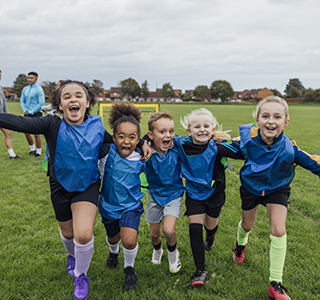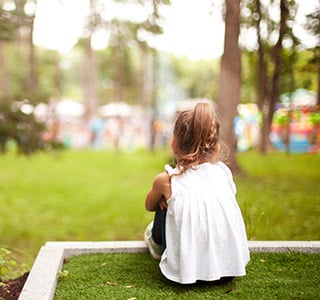It's not perfect. It's parenting.
Sometimes you need answers to the little everyday things that parents encounter. And sometimes, you just need someone to encourage you through all of the craziness and challenges of parenthood. Welcome to Parent-ish, a blog from the experts at Children's Mercy.

Get updates
Have a parenting hack to share? Or a topic you'd like to see?
Category: Mental health
Outbreaks don’t come with a manual – but this can help
Let’s be real: parenting during an outbreak like the flu or measles is like trying to juggle flaming swords while riding a unicycle—on a tightrope—over a pit of Legos. It’s a lot. And while we can’t make the germs go away (if only!), we can help you feel a little more prepared, a little more grounded and a lot more supported.
Addressing body image concerns in teen boys
While stereotypes may say differently, body image issues are not exclusive to girls; they are increasingly prevalent among teen boys as well, often leading to significant mental and physical health challenges. As parents, understanding these issues and knowing how to support your son or other teen boys in your life is crucial. Keep reading for insight into common signs of body image issues, the role of social media and ways to help foster a healthy body image.
Summer break guide: Boosting your kids' and teen's mental health
Summer break is a time of excitement and relaxation for many kids and teens, but it can also bring unique challenges to their mental health. Without the structure and routine of school, young people may experience increased anxiety, loneliness and boredom. But as parents, there are things you can do to help support your child's mental health during the summer months. Keep reading for tips for your whole family to have a great summer!
5 teen relationship red flags
I spend a lot of time talking to patients and parents about healthy relationships. It’s common for teens to have some less-than-great experiences as they take more ownership over their social lives. With support from schools, health care professionals and other trusted adults, parents can help adolescents prioritize positive connections and avoid harmful dynamics.
Resources for helping kids process the anniversary of the Super Bowl parade shootings
The horrific events that took place after the 2024 Chiefs parade and rally at Union Station may again strike fear a year later, especially for children and families who were at the parade and witnessed terrifying things. Anniversary reactions are a common part of the recovery process after tragic events, especially those that include loss and fear. To support your child, we've created resources and guidance on what to look out for.
How to support your kids through big life changes
Most children will experience impactful life changes – “big” changes. Even expected life transitions can be stressful and feel “big” to kids, such as a sibling leaving for college, transitioning from elementary school to middle school or having a new team or coach. Your goal as a parent or caregiver is to give your kids the skills and tools to navigate these changes successfully and help kids feel confident they can cope with these feelings and act in ways that help them adapt to change.
Dealing with parenting peer pressure? Our providers have been there, too.
Parenting is hard, and is even harder when friends, family or even your children have opinions on your parenting choices. If you’ve ever felt this way you're not alone – experts in the pediatric health field experience this, too. Keep reading to learn how this panel of parents has had to uphold their boundaries and provide advice for you to do the same.
Growing your child’s emotional piggy bank
All humans have an emotional piggy bank, and throughout the day all your interactions result in a deposit or a withdrawal. All these little things add up, and if you’ve had more withdrawals than deposits, you may feel like you don’t have much left to give. As parents, you can make sure your children have plenty of deposits, so they can better deal with the withdrawals that come their way.
How to keep youth sports fun
This just in: Kids like to have fun. It shouldn’t be news, but in the current competition-crazy culture of youth sports, it is. “Fun” is the key idea parents should remember from the new State of Play Kansas City, a report and study by the Aspen Institute Sports & Society Program and a broad group of KC-area youth sports advocates (including Children’s Mercy Kansas City).
Teaching kids not to bully – and how to react if you find out they are
We all think the best of our kids – but that doesn’t mean at some point, they won’t exhibit bullying behaviors. Why does this happen, how can you teach your kids not to bully and most importantly…how do you react if you find out they’ve bullied a classmate or friend?
Are you a new parent feeling sad, tired or anxious? Here is a guide to help.
While many moms and other birthing people experience the “baby blues” in the first 2 weeks after having a baby (worry, sadness and tiredness), these symptoms usually resolve on their own. However, Perinatal Mood and Anxiety Disorders (PMADs) can be more serious
Ways to handle homesickness
Staying the night at an aunt’s house or an overnight sleepaway camp is often the first chance a child experiences a go of independence. Even the most confident of kids may experience homesickness and there are ways parents can help.
Anxiety and depression: what parents and caregivers should know
Mental health is becoming more commonly talked about and less stigmatized, which is a step in the right direction. Still, many adults are unsure of how to support children’s mental wellbeing. Sadness and nervousness are normal human emotions, so how do you know what type of support to give your child? We’re sharing guidance from our clinical expertise to help you answer that question.
What every parent should know about preventing child abuse
Everyone deserves to be respected, nurtured and loved. But many children and teens face a different reality. Caring adults need to be aware of the signs of child abuse and how they can help prevent it.
Attending large events following a tragedy
Our community is still processing the events of the post-Super Bowl parade. A day meant for celebration quickly turned into a nightmare for families who were in attendance, or even watching it on TV. As your family considers attending large events – sporting events, concerts, shows – that you once enjoyed, planning these activities now comes with extra concern.















